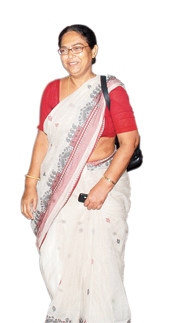 |
| Sunanda Mukherjee, the new women’s commission chief. A Telegraph picture |
Sunanda Mukherjee finds it paradoxical that as the new state women’s commission chief she is being introduced as someone’s wife.
“It cannot be denied that I am Kshiti Goswami’s wife,” she says with a touch of laughter in her voice. “But that doesn’t mean that I should not be referred to by my own name. If a women’s commission chairperson is known as someone’s wife it defeats the purpose.”
On Monday, walking into the visitors’ room in her two-storey house in a quiet Bagha Jatin bylane that branches off from the noisy main street choking with autorickshaws, cyclerickshaws and cars, Mukherjee, 56, looks a bit like your favourite school teacher. Dressed in a plain taant sari, a little sternly perhaps, she speaks softly. But her face breaks into a broad smile every now and then. She joined the commission officially the same day, about three weeks after her appointment.
“It was a bit of a surprise,” she says of the announcement of her name on television, though she had heard she was being considered. She says the possibility of her husband, a veteran RSP leader and the PWD minister in the former Left Front government, getting into trouble with his party because of her appointment by Mamata Banerjee’s government is absurd.
“I left active politics from the 90s,” says the mother of two, who started off as a leader of the Progressive Students’ Union (PSU), the student wing of the RSP, in the 70s and later became a local committee member of the RSP. From the 90s, she was working with the organisation APDR (Association for Protection of Democratic Rights) headed by activist Sujato Bhadra. In 1994, the RSP cancelled her membership. “So there is no question of their taking offence,” she says. Her choice is her choice alone; it does not reflect on her husband.
She has been a bit of a streetfighter, sometimes successfully, sometimes taking up lost causes. Sometimes the same battles as Mamata Banerjee, as when she campaigned against the death of Subhas Das in the Bhowanipore police station lock-up in 1995. “Mamata Banerjee too was protesting on the streets. A judicial inquiry was ordered and compensation given to not only Subhas’s wife but also to his long-time companion,” Mukherjee says.
She and her APDR colleagues had tried to protect the women who sold old clothes at the “Gujarati haat” in Tollygunge, getting up before dawn to be at the market. “These women visit houses and exchange old clothes with utensils. They sell the clothes at the early morning market, called the ‘Gujarati haat’. They were evicted from Tollygunge after facing severe and repeated harassment from the police.”
Her organisation rehabilitated them by the “chhoto” Lake, following which she and her colleagues would go there around four in the morning to guard the women against the police. But eventually the women were evicted from that spot too. “That happens, doesn’t it? Women face resistance everywhere,” says Mukherjee. “It is not easy for a woman to earn and be free.”
As the new commission chairperson — she succeeds Malini Bhattacharya, who resigned after the Assembly poll results — her priorities will be strengthening the women’s grievance cells in police stations and making police stations women-friendly. It will not solve basic problems, but things such as the lack of livelihood of women are “universal (sarbik)” concerns, she says, not issues that can be corrected by a women’s commission.
Mukherjee intends the commission to look into another issue — places for women to stay. “Even if a woman is tortured by her husband and wants to go away, she can’t, because there are 10 men in the streets waiting to pounce on her. I will try to start homes, including short-stay-homes, where women can stay. Get a livelihood training if required,” she says.
“Of course, a woman needs to make an effort to go ahead herself. Look at Mamata Banerjee,” stresses Mukherjee. “But women need a place to fight from. They need a basasthan, a home.” To fight, one needs to plant her feet firmly somewhere. A locus standi, something so many women are denied.











